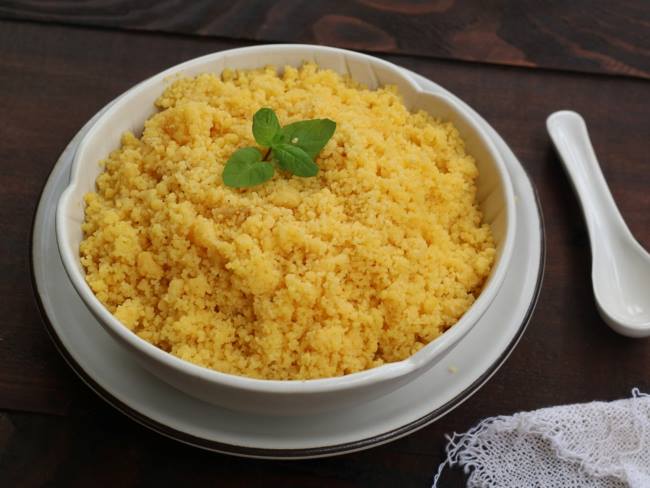Hello Insight
Corn rice is a food made from dried shelled corn which is coarsely ground or mashed and then cooked like rice. Because it is made from corn, this food is considered healthy and friendly for diabetes sufferers.
Corn rice is often consumed as a staple food substitute for white rice, especially in East Java, Madura, Gorontalo and Bali. In some areas, corn rice is also called empok rice and balabinde.

Corn rice has a slightly coarser texture compared to white rice and a slightly sweet and savory taste. Usually, corn rice is served with side dishes, such as salted fish, urap, vegetable lodeh, stir-fried eggplant, tofu, tempeh, or shrimp paste chili sauce. Corn rice is a source of complex carbohydrates and contains various important nutrients for the body. 100 grams of corn rice contains around 360 calories and the following nutrients: Corn rice also contains vitamin B complex, zinc, folate, choline and antioxidants. This food also has a lower glycemic index than white rice, making it suitable for consumption by diabetics or people who are on a diet. Thanks to its nutritional content, corn rice can provide the following health benefits: The main benefit of corn rice is that it makes the body more energetic. This is thanks to the complex carbohydrate content in corn rice which is digested more slowly by the body, thus providing energy and making the stomach full longer. The B vitamin content in corn rice also contributes to maintaining energy balance, supporting muscle function, and optimizing the body's metabolism. Corn rice is often recommended for diabetics because it has a lower glycemic index than white rice, so it does not cause a rapid spike in blood sugar. Apart from that, its high fiber content helps slow the absorption of carbohydrates, so that blood sugar levels can remain under control. However, this also needs to be adjusted to the portions and other food menus. Because it contains natural sugar, corn rice can increase blood sugar levels if consumed excessively or together with foods high in sugar. The fiber in corn rice is quite high. Therefore, consuming corn rice can stimulate bowel movements and make the stool texture denser. This makes corn rice suitable for consumption to prevent and treat constipation. Apart from that, corn rice also has a prebiotic effect, so it can support the growth of good bacteria in the intestines. With the presence of these good bacteria, the digestive system will always be healthier and can be stronger against germs that cause infections in the intestines. Corn rice is also good to consume to maintain eye health and reduce the risk of eye problems. This is because rice corn contains lutein and zeaxanthin, namely antioxidants that are important in protecting body cells from damage, including cells in the eyes. These two compounds help protect the eyes from damage caused by free radicals and prevent age-related eye diseases, such as macular degeneration. Corn rice can help maintain ideal body weight because of its high fiber and complex carbohydrate content. These two nutrients tend to be digested more slowly, so they can make your stomach feel full for longer. That way, it will be easier for you to control portions and appetite. However, apart from following a healthy diet with corn rice, you also need to exercise regularly and reduce excessive fat and calorie intake to support the success of the diet. The phosphorus content in corn rice plays a role in maintaining the health and strength of bone and tooth tissue. That way, the risk of osteoporosis can be reduced. Not only that, corn rice is also rich in potassium which plays a role in increasing calcium absorption in the body. However, to optimize these benefits, you also need to get sufficient intake of calcium and vitamin D, both from food and supplements. Corn rice is a good choice to support heart health because its fiber content helps reduce levels of bad cholesterol (LDL). Meanwhile, the potassium content in it helps keep blood pressure stable. These two benefits play an important role in maintaining a healthy heart and blood vessels, as well as reducing the risk of developing cardiovascular disease, including heart disease and stroke. With its superior nutritional content, corn rice can be a daily food choice for a healthier life. You can apply the following steps to make your own corn rice at home: Ingredients: How to cook: If you want faster results, you can use coarsely ground corn or ready-made corn rice which is easier to cook like regular rice. It's a shame to miss the benefits of corn rice. However, if you plan to consume it as a staple food and have certain health conditions, you are advised to first consult with a doctor via Chat with a Doctor to ensure safety and suitability for your condition.Corn Rice and Its Nutritional Content
Benefits of Corn Rice for Health
1. Healthy energy source
2. Controls blood sugar levels
3. Facilitates digestion
4. Maintain eye health
5. Maintain ideal body weight
6. Maintain bone health
7. Maintain heart health
How to Make Corn Rice
Comments
Post a Comment